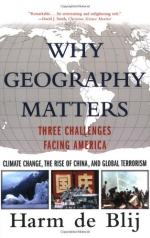
|
| Name: _________________________ | Period: ___________________ |
This test consists of 15 multiple choice questions and 5 short answer questions.
Multiple Choice Questions
1. Why does de Blij call global warming a misnomer?
(a) Because Earth has been steadily cooling off since the Hadean period.
(b) Because warming will probably be regional, not global.
(c) Because the globe will probably cool down, not warm up.
(d) Because global warming occurs throughout Earth's history.
2. Which of the following countries has borders that are in dispute?
(a) Sweden.
(b) The United States.
(c) Tibet.
(d) Mexico.
3. Which country does de Blij think that Americans should try to be particularly well-informed about?
(a) Mexico.
(b) Botswana.
(c) Iraq.
(d) China.
4. What profession does de Blij say should include training in cartography?
(a) Law.
(b) Art.
(c) Politics.
(d) Teaching.
5. What is the name of the interglacial that we are currently in?
(a) The Eemian.
(b) The Atlanticum.
(c) The Subboreal.
(d) The Holocene.
6. Which of the following countries does de Blij think will play an important role in the new world order?
(a) Great Britain.
(b) France.
(c) India.
(d) Somalia.
7. Which of the following countries was never colonized by Europe?
(a) Ethiopia.
(b) Egypt.
(c) South Africa.
(d) Kenya.
8. Why has the United States been so slow to convert maps to the metric system?
(a) Geographers prefer not to use the metric system in maps until it is used for other things too.
(b) U.S. geographers are not accustomed to the metric system and prefer not to use it.
(c) The Ordinance of 1785 required land to be laid out in township squares measured in feet.
(d) The metric system is not as efficient for mapmaking as the English system of measurement.
9. Which of the following is one of the characteristics of a nation-state?
(a) A territory that exists within boundaries that can be drawn on a map.
(b) A territory that is governed by several allied governments.
(c) A people who speak the same language but live in different countries.
(d) A people who wander from place to place as nomads.
10. About what percentage of American students have studied geography in school?
(a) Less than 50 percent.
(b) Less than 10 percent.
(c) Less than 30 percent.
(d) Less than five percent.
11. What reason did Iraq give for invading Kuwait just before the first Gulf War?
(a) Iraq claimed that Kuwait was invading Iraqi airspace.
(b) Iraq claimed Kuwait was drilling into Iraq's underground oil reservoirs.
(c) Iraq claimed that Kuwait was diverting Iraq's water supply.
(d) Iraq claimed that Kuwait had invaded Iraq.
12. As the world's population increases, where does de Blij say the increase in population will go to live?
(a) To urban areas.
(b) To undeveloped countries.
(c) To developed countries.
(d) To more temperate regions.
13. What human event coincided with the end of the Little Ice Age?
(a) The fall of the Roman Empire.
(b) The French Revolution.
(c) The rise of the Han Dynasty.
(d) The Industrial Revolution.
14. What continent will decline in population by 2050, according to the United Nations?
(a) Africa.
(b) Asia.
(c) North America.
(d) Europe.
15. What war does de Blij say could have been better handled if U.S. leaders had had a better grasp of geography?
(a) The Vietnam War.
(b) World War I.
(c) The Korean War.
(d) World War II.
Short Answer Questions
1. Why is a compass rose more useful in the United States than in Europe?
2. Who does de Blij describe as a modern proponent of environmental determinism?
3. What does de Blij mean when he refers to a mental map?
4. What historical event may have given rise to the stories in many cultures of a Great Flood?
5. What kind of location must be given in degrees, minutes, and seconds of longitude and latitude?
|
This section contains 673 words (approx. 3 pages at 300 words per page) |

|




